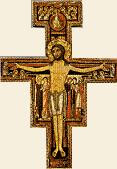 Saint Francis desired that these times be spent in manual labor in order to avoid idleness, but always in such way as to forestall any danger to our life of prayer and contemplation. In the Holy Rule, our Seraphic Father directs: ‘Let the friars work faithfully and devotedly so that, having done away with idleness, the enemy of the soul, they do not extinguish in themselves the spirit of holy prayer and devotion, to which all temporal things should be subservient.''
Saint Francis desired that these times be spent in manual labor in order to avoid idleness, but always in such way as to forestall any danger to our life of prayer and contemplation. In the Holy Rule, our Seraphic Father directs: ‘Let the friars work faithfully and devotedly so that, having done away with idleness, the enemy of the soul, they do not extinguish in themselves the spirit of holy prayer and devotion, to which all temporal things should be subservient.''Likewise, in order to dispel idleness, the intellectual labor necessary for the Apostolate must be pursued. ‘To those friars who were asking whether or not it pleased him that the learned men, who had already been received into the Order, should devote themselves to study Sacred Scripture, Francis responded: 'It is indeed pleasing to me. But following the example of Christ, Who, we know, did more praying than reading, let them not omit the pursuit of prayer, nor let them study only for the purpose of learning how to speak. But they should study so that they may do the things they have learned, and when they have done these things, let them teach others to practice them also.'‘
Thus, Franciscans to whom God has given the grace to study, ought to regard study not only as a means of obtaining knowledge, but should value it even more as a basis for action. Moreover, they should preach more by their deeds than by their words. We read that ‘Blessed Francis did not want his friars to be desirous of knowledge and books, but he desired and preached to them that they should be eager to have and to imitate that pure and holy simplicity in which the saints and early Fathers of the Church were steeped. And he believed this a more secure way to obtain the salvation of souls.''
To sum up, therefore, let us remember that knowledge and study, as well as the entire active life, should all conduce to the contemplative life -- to fostering union with God. Otherwise we could not extol their value, but rather the contrary, they would have to be discouraged as being detrimental to the spiritual life. If however, knowledge and study are utilized in the right spirit, besides being necessary for the Apostolate, they can actually be counted as among the best means of attaining perfection!
















